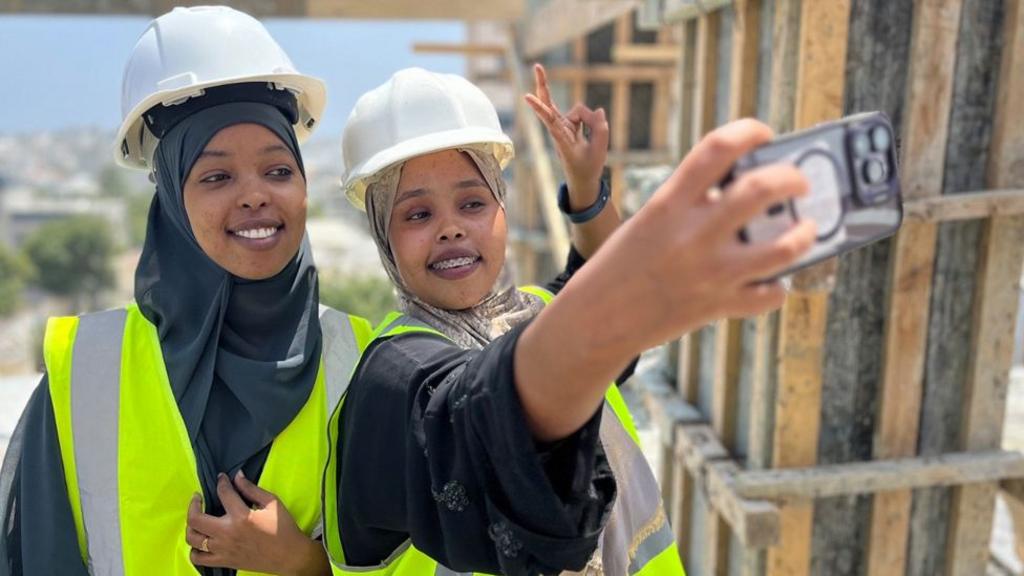Somalia’s capital, Mogadishu, is experiencing a construction boom. This resurgence from a violent past presents unexpected opportunities for women like Fathi Mohamed Abdi and Saadia Ahmed Omar.
These two young female engineers are overseeing the construction of a ten-story apartment complex in Mogadishu’s Hodan District.
Navigating the construction site in hard hats, they direct an all-male team.
“Initially, people doubted me,” explains Ms. Abdi, the chief operating officer of Arkan Engineering Services, a Somali construction firm, in an interview with the BBC.
“They questioned the reliability of a woman-built house, expressing concerns about entrusting their money and property to a young female engineer.”
Both she and Ms. Omar have been practicing engineers for five years.
“Mogadishu needs us,” states Ms. Omar. “I witnessed the city’s chaos as a child; now, we contribute to its reconstruction.”
Somalia, a former Italian colony, endured a protracted civil war following the collapse of President Siad Barre’s government in 1991.
Decades of war left visible scars, particularly in the Shangani district. Yet, these ruins are increasingly concealed or replaced by modern buildings, creating a skyline punctuated by cranes and scaffolding.
Both women were born during the civil war and witnessed the country’s fragmentation. While many Somalis emigrated, they remained, driven by a commitment to rebuilding amidst the ongoing al-Shabab insurgency.
“The high demand for skilled professionals, exceeding the supply, has created opportunities for women in this field,” Ms. Omar observes.
Ibrahim Abdi Heyle, chairman of the Somali Engineers Association, concurs, noting the gradual shift in Somalia’s traditionally male-dominated society.
“The surge in infrastructure, energy, and technology projects necessitates increased female participation. Their contributions are crucial in addressing workforce shortages,” the 34-year-old explains.
“Empowering women engineers not only fulfills demand but also introduces diverse perspectives and innovative solutions.”
Mogadishu’s mayor’s office reports the construction of over 6,000 buildings in the last five years, dramatically altering the city’s landscape.
“Improved security has fueled an increase in high-rise and commercial construction,” says Salah Hassan Omar, the mayor’s spokesperson.
However, Ms. Abdi and Ms. Omar’s journey hasn’t been easy; women comprise only 5% of engineers, and mentorship opportunities are limited.
“Many internship applications were rejected,” Ms. Omar recalls. “They doubted a woman’s ability to meet the physical demands of engineering. I searched for three months before securing an opportunity.”
Today, they are among Mogadishu’s leading female engineers, having overseen over 30 multi-million dollar projects.
“The city boasts taller buildings and modern infrastructure, a stark contrast to the past,” Ms. Abdi declares with pride.
This transformation isn’t universally welcomed. Veteran architect Siidow Cabdulle Boolaay mourns the loss of Mogadishu’s historical character.
“Pre-war buildings were architecturally stunning, featuring rare Italian-style designs for Africa,” he tells the BBC. “Mogadishu’s urban planning was highly structured.”
Mr. Boolaay also raises safety concerns: “The salty sand used undermines building effectiveness.”
Coastal sand, frequently used in cement, is problematic due to its high salt content, which can corrode steel—a practice often restricted by international building codes.
“These buildings lack fire safety measures and proper electrical installations,” he adds, expressing disappointment.
He worries that the rapid construction pace compromises quality control.
For years, a lack of regulations raised structural integrity concerns.
Mr. Omar from the mayor’s office acknowledges this, stating that while nothing can be done about pre-existing buildings, “quality control is now mandatory for new construction.”
“New laws will define high-rise and residential building zones.”
However, concerns remain about enforcement given the construction boom’s speed.
Ms. Abdi and Ms. Omar, Plasma University Mogadishu graduates, confirm that all their projects have received local authority approval.
The construction boom is fueled by diaspora investment and improved security, despite ongoing threats from al-Shabab.
Remittances constituted 16.7% of Somalia’s GDP in 2022 (World Bank data), creating opportunities for architects and engineers.
However, rapid urbanization presents infrastructure challenges, including a lack of proper sewage systems and risks of groundwater depletion from unregulated borehole drilling.
Christophe Hodder, a UN advisor, warns of potential long-term environmental consequences.
“A coordinated water management approach is crucial; otherwise, we risk a future crisis. Each building digs its own borehole,” he told the BBC.
A new sewage system is underway, but its implementation might necessitate building demolitions, potentially displacing residents and businesses.
Mr. Hodder notes Mogadishu’s high population density, driven by drought and conflict.
Increased urban population, especially in slums, might exacerbate poverty and inequality.
Despite challenges, Mogadishu’s future appears promising. The city aims to implement urban development regulations, improve infrastructure, and ensure sustainable growth.
Even al-Shabab attacks, often targeting hotels frequented by politicians, don’t deter the Somali Engineers Association.
Mr. Heyle acknowledges the setbacks but highlights Somalis’ resilience, particularly within the engineering field.
“Despite explosions, our dreams persist. We’re reviving the engineering profession, signifying hope.”
The ambition is for Mogadishu to become a model of post-conflict reconstruction within five years.
“Mogadishu is transformed from the 1990s, developing in line with the modern world,” says Ms. Omar.
“Seeing buildings I helped create fills me with pride. We’re building hope.”
Ms. Abdi adds, “We’re demonstrating that women can design, lead, and shape the city.”
Go to BBCAfrica.com for more news from the African continent.
Follow us on Twitter @BBCAfrica, on Facebook at BBC Africa or on Instagram at bbcafrica
Chris Jeffery, from Tunbridge Wells, is raising awareness of the rights of working family carers.
Conflict between nomadic herders and settled farmers over land and resources are common in the region.
The agriculture ministry calls on divine intervention to achieve food security, angering many.
These are the highest-profile peace talks the UN has led since M23 rebels took over the city of Goma.
US aid to Africa has been cut and now defence is in Trump’s sights – but it may prove more costly.

